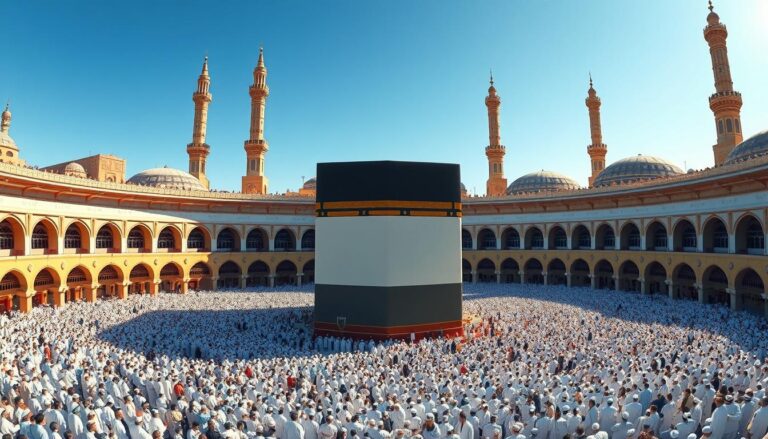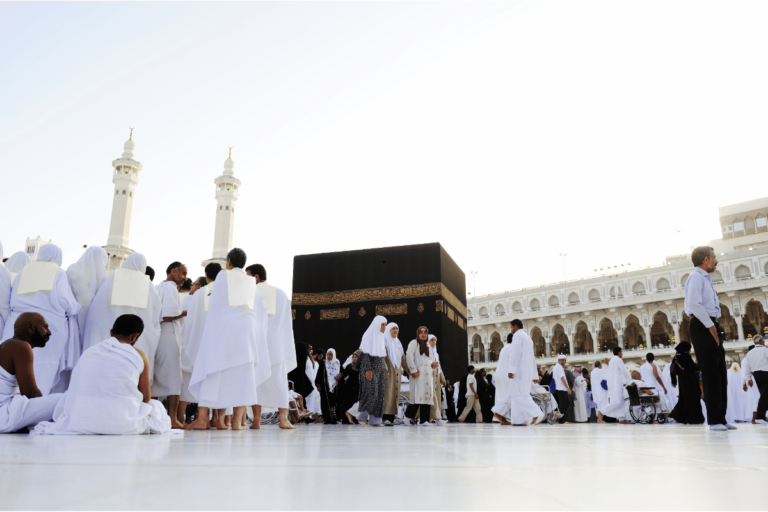Islamic Teachings on Protecting the Environment – A Green Perspective
Can faith inspire eco-friendly living? Islam offers a unique view on protecting the environment. It has a deep framework for living sustainably and caring for the planet, based on its teachings and practices.
Islamic teachings say we must protect the Earth. The Qur’an and Prophet Muhammad’s words stress the need to conserve resources and respect all life. These ideas match today’s eco-friendly actions, giving us valuable lessons for our environmental problems.
Sustainable living in Islam is more than just managing resources. It’s about living a balanced life, using things wisely, and loving nature. Islamic actions, like saving water and planting trees, show us how to lessen our impact on the planet.
As we look into Islam’s green teachings, we’ll see how old wisdom can lead us to a greener future. Let’s discover the eco-friendly practices in Islam that help us care for our planet better.
Key Takeaways
- Islamic teachings emphasize environmental stewardship as a sacred duty
- The Qur’an provides insights on ecological balance and resource conservation
- Prophet Muhammad’s examples promote sustainable living and animal welfare
- Islamic principles align with modern environmental conservation efforts
- Eco-friendly practices in Islam offer practical solutions to current environmental issues
Understanding Islamic Environmental Ethics
Islamic principles of conservation come from the idea of stewardship. Muslims see themselves as caretakers of nature, tasked with protecting the environment. This belief is at the heart of Islamic environmental ethics.
Stewardship in Islam
In Islam, humans are seen as khalifa, or guardians of the Earth. This role comes with a big responsibility to care for Allah’s creation. The Qur’an reminds believers to keep things balanced and avoid harming the environment.
Environmental Conservation as Religious Duty
In Islam, taking care of the environment is not just a choice; it’s a duty. Muslims are urged to use resources carefully and avoid waste. This aligns with today’s ideas of sustainability, showing Islamic teachings can guide us towards eco-friendly living.
Quranic Verses on Environmental Protection
The Qur’an has many verses that stress the need to protect the environment. These verses warn against wasteful actions and encourage keeping the Earth’s balance. For instance, Surah Al-A’raf, verse 56 says:
“Do not cause corruption on the earth after it has been set in order.”
This verse makes it clear that humans should protect and preserve the environment. By following these teachings, Muslims can help with global conservation efforts while fulfilling their religious duties.
The Quranic Perspective on Nature and Creation
The Quran gives us deep insights into caring for the environment and nature’s importance. It names 114 Suras after natural elements, showing how faith and nature are connected. This shows our role as caretakers of Earth.
Islamic environmentalism believes God’s presence is in all of nature. The Quran says, “Wherever you look, you see God,” reminding us to protect His creation. As Earth’s caretakers, we must develop and protect it.
“The true servants of the Most Compassionate are those who walk on the earth humbly” (Quran 25:63)
This verse teaches us to live lightly on Earth and reduce our environmental impact. The Quran also emphasizes keeping promises, including our duty to the environment.
Islamic environmentalism sees human dignity as a result of being God’s representatives. This status means we must protect and care for all of God’s creations. Understanding our role helps us know ourselves and God better.
Prophet Muhammad’s Environmental Teachings
Prophet Muhammad’s teachings on the environment are timeless. They guide us in living sustainably, even today. His wisdom, shared over 1400 years ago, still helps us face today’s environmental problems.
Hadiths on Resource Conservation
The Prophet stressed the need to save natural resources. He taught his followers to use water wisely, even for ablutions. This advice matches today’s efforts to conserve water.
Prophetic Examples of Sustainable Living
Muhammad’s life showed us how to live sustainably. He taught against waste and encouraged moderation. He said, “Eat and drink, but waste not by excess.” This advice is still important today for using resources wisely.
Islamic Principles of Animal Welfare
The Prophet cared deeply for animals. He forbade cruelty and encouraged kindness towards them. Muhammad once said, “Whoever is kind to the creatures of God is kind to himself.” This principle guides Islamic teachings on animal welfare.
- Protect natural resources
- Practice moderation in consumption
- Treat animals with kindness
These teachings are the heart of Islamic environmental ethics. They give us valuable lessons for today’s environmental challenges. They show how Prophet Muhammad’s teachings are still relevant in our world today.
Islamic Principles of Conservation and Sustainability
Islamic teachings on the environment are key to a full approach to saving our planet. The Quran talks about Earth 61 times, showing its importance. It teaches us to see ourselves as caretakers, not owners.
The Islamic view on taking care of the Earth is based on ‘khalifah’ or guardianship. Muslims are urged to protect natural resources, seeing them as shared by all. This includes land, water, air, forests, and oceans.
Prophet Muhammad’s teachings are vital in Islamic views on the environment. He taught the value of planting trees and restoring land, seeing it as a form of charity. His guidance also covers water saving, reducing waste, and caring for animals.
“If a Muslim plants a tree or sows seeds, and then a bird, or a person or an animal eats from it, it is regarded as a charitable gift for him.” – Prophet Muhammad
Islamic principles for saving the environment include:
- Protecting wildlife and natural resources in special zones
- Using water wisely and respecting its rights
- Reducing waste and stopping pollution
- Planting trees and keeping plant life safe
These principles match today’s goals for sustainability. They offer a faith-based way to tackle global environmental issues. By living these principles, Muslims can greatly help in saving our planet and living sustainably.
Islamic Teachings on Protecting the Environment – A Green Perspective
Islamic teachings provide a solid base for eco-friendly actions. The Quran and Sunnah guide Muslims to live sustainably. They stress the need to care for the environment. With over 2 billion followers, Islam’s green efforts could greatly impact the world.
Eco-friendly Practices Inspired by Islamic Teachings
Islam teaches its followers to think about their environmental impact. The Quran has about 200 verses on environmental topics. These verses show the importance of protecting God’s creation. They inspire many eco-friendly actions in Islam:
- Reducing food waste
- Conserving water
- Planting trees
- Protecting wildlife
Islamic Approach to Environmental Stewardship
The Islamic view on caring for the environment is based on khalifah, or guardianship. Muslims see themselves as Earth’s caretakers, responsible for its protection. This view matches today’s sustainability goals, aiming for a balance between human needs and environmental safety.
Green Initiatives in Muslim Communities
Muslim communities around the world are taking on green practices inspired by the Quran and Sunnah. Some notable efforts include:
- The Green Ramadan campaign, which encourages sustainable practices during the holy month
- Investment in renewable energy, like solar and wind power
- Green mosques using eco-friendly features, such as solar panels and recycling
These actions show how Islamic teachings can tackle today’s environmental issues. They help create a balance between faith and nature.
Water Conservation in Islamic Traditions
Islamic teachings stress the importance of saving water. The Holy Qur’an talks about water 63 times. This shows how vital it is in Islamic life. Muslims must wash their hands five times a day before praying, making water saving key.
Prophet Muhammad showed us how to use water wisely. He washed his hands with just one mudd of water, about 750ml. This is very different from today’s habits, as shown by a water challenge test:
- Person 1 used 3.4 liters (4.5 times more than sunnah)
- Person 2 used 12.6 liters (16 times more than sunnah)
- Person 3 used 2.6 liters (3.5 times more than sunnah)
The Qur’an warns against wasting in Surah Al A’raf: “O Children of Adam! Eat and drink but waste not by excess, for God loveth not the wasters” (7:31). This verse also applies to water, encouraging us to live sustainably.
Islamic law requires fair water sharing. Farms near streams can’t take all the water. Upstream users must think about those downstream. These rules show Islam’s view of water as something we all share, promoting both conservation and fairness.
Islamic Views on Pollution and Waste Management
Islamic teachings stress the importance of keeping things clean and avoiding pollution. The Qur’an talks about purification over 30 times, linking it to faith. This idea of cleanliness is not just about personal hygiene but also about taking care of the environment.
Quranic Teachings on Cleanliness
In Islam, being clean is seen as a part of faith. The Qur’an tells Muslims to keep their bodies and surroundings clean. This idea matches modern views on environmental health, which aim to prevent sickness and improve well-being by tackling environmental dangers.
Islamic Perspectives on Industrial Pollution
Islam sees pollution as something that makes humans impure. This view can help tackle modern pollution problems. Islamic law bans actions that harm or destroy the environment, including air pollution.
Waste Reduction Strategies in Islamic Contexts
Eco-friendly actions in Islam focus on reducing waste and protecting the environment. Islamic groups have worked on environmental issues since the 1980s. Some of their strategies include:
- Encouraging sustainable agriculture
- Promoting renewable energy sources
- Supporting permaculture initiatives
These efforts show the Islamic belief that both current and future generations deserve a clean environment. By linking environmental health with Islamic teachings, communities can better understand the importance of preserving the environment. This understanding can improve health and lifestyle.
Sustainable Agriculture and Land Management in Islam
Islamic teachings stress the need for sustainable living and responsible land use. The Qur’an and the Prophet Muhammad’s words underline the importance of saving natural resources. They also warn against wasteful practices in farming.
Islam sees planting trees and farming as acts of kindness. The Prophet Muhammad taught, “If a Muslim plants a tree or sows seeds, and then a bird, person or animal eats from it, it is regarded as a charitable gift for him.” This shows Islam’s value on caring for the environment and farming sustainably.
The idea of balance (mīzān) is key in Islamic views on the environment. The Qur’an says, “And the earth We have spread out; set thereon mountains firm and immovable; and produced therein all kinds of things in due balance” (15:19). This verse reminds us to keep our farming practices in balance with nature.
“Eat and drink: But waste not by excess, for Allah loveth not the wasters” (Qur’an 7:31)
This verse from the Qur’an teaches us to use resources wisely. It tells us to live sustainably by not wasting. These teachings can help us make farming more eco-friendly today.
- Promote crop rotation to maintain soil health
- Use natural fertilizers and pest control methods
- Conserve water through efficient irrigation systems
- Preserve biodiversity by planting diverse crops
By applying these Islamic principles to farming, we can make our land use more sustainable. This way, we fulfill our duty to care for the earth.
Islamic Scholars’ Contributions to Environmental Protection
Muslim scholars have made big steps in protecting the environment. They mix Islamic teachings with today’s conservation efforts. This creates a strong force for change.
Contemporary Fatwas on Environmental Issues
In 2014, Indonesia issued a fatwa to protect endangered species. This shows religious leaders’ power to promote conservation.
Islamic Environmental Movements and Organizations
In 2015, Muslim leaders in Istanbul created a plan for climate change. This plan aims for a future with less pollution and more resilience.
Integrating Islamic Teachings into Modern Conservation Efforts
Professor Odeh Al-Jayyousi suggests a Green JIZ model. It combines activism, innovation, and lifestyle changes. This is an Islamic way to address climate change and sustainability.
Islamic scholars are rethinking old teachings for today’s environmental problems. They focus on the Quran’s idea of ‘khalifah.’ This means humans are caretakers of the Earth, aligning with today’s conservation goals.
“The Quran contains over 200 verses that mention the environment, emphasizing the responsibility humans have to care for the Earth.”
By blending Islamic teachings with green practices, scholars are getting Muslims involved in environmental issues. This is especially important in countries like Indonesia, Bangladesh, and Pakistan, which face big environmental challenges.
Conclusion
Islamic teachings on protecting the environment offer a green perspective that matches today’s sustainability goals. The Quran and Prophet Muhammad’s teachings give us a strong guide for taking care of our planet. They stress the need for saving water, using resources wisely, and farming in a sustainable way.
Muslims are taught to see protecting the environment as a religious duty. For example, the Prophet made a 30-kilometer area around Medina a protected zone. This area was kept safe for trees and animals. It shows how Islamic teachings can lead to eco-friendly actions in Muslim communities all over the world.
The Islamic Declaration on Global Climate Change, written by Dr. Fazlun Khalid, sees humans as part of Earth’s ecosystem. This view, along with Quranic mentions of biodiversity, shows Islam’s complete approach to caring for the environment. By using these teachings in today’s conservation efforts, we can tackle global environmental problems better.
Prince Charles said seeing environmental protection as a religious duty can encourage more care for our planet. This conclusion shows how Islamic teachings on protecting the environment are still relevant today. They offer a green perspective that can guide Muslims and inspire others everywhere to live sustainably.
Source Links
- 5 Things Prophet ﷺ Taught Us About Protecting the Environment
- Spirituality, Sustainability, and the Environment: An Islamic Perspective | eePRO
- When the Earth Speaks Against Us: Environmental Ethics in Islam | Yaqeen Institute for Islamic Research
- Interview with eco-Islam scholar and 11 books for sustainable Muslims
- The Environment from the Perspective of the Qur’an and Divine Teachings
- What the Quran Says about Environmental Activism
- What are the teachings of Islam on Environmental Protection? – Wisconsin Muslim Journal
- Islam and Ecological Sustainability: An Exploration into Prophet’s Perspective on Environment
- The Islamic Principles on Sustainable Development | EcoMENA
- The Role of Islamic Teachings in Protecting the Planet (Dr. Hanaa Albanna) — AllCreation.org
- Islamic perspective on the environment
- How Muslim Perspectives Affect Climate Justice
- Water Conservation in Islamic Teachings
- The Prophetic Practice Of Water Conservation
- Integrating Environment with Health: An Islamic Perspective
- ‘Green Islam’: Islamic environmentalism in Indonesia – New Mandala
- 17_Samarah_Abdul Basir Muhammad_Environmental Preservation and Water Pollution According to
- Islam’s Perspective on Environmental Sustainability: A Conceptual Analysis
- Environmental Sustainability in Islam | EcoMENA
- An Islamic Perspective on Ecology and Sustainability
- How Islam can represent a model for environmental stewardship
- What does Islam say about climate change and climate action?
- The Islamic Perspective on Environmental Protection: Principles and Practices
- Islamic Perspective on Biodiversity — Khaleafa
- Religions and environmental protection







